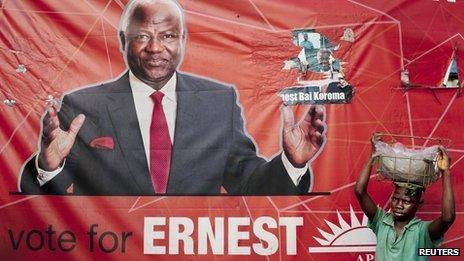Sierra Leone holds third general elections
- Published

Polls have closed in Sierra Leone in its third general election since the 1991-2002 civil war, which killed more than 50,000 people.
A coalition of non-governmental organisations, National Election Watch, said the voting went well, with some delays in opening polling stations.
Incumbent President Ernest Bai Koroma faces eight candidates, including ex-military leader Julius Maada Bio.
The poll was being closely monitored by several thousand local observers.
Voters were choosing a new president, parliament and local councils.
The results have to be declared within 10 days of voting taking place.
The three main parties in the running are Mr Koroma's All People's Congress (APC), Mr Bio's Sierra Leone People's Party (SLPP) and the People's Movement for Democratic Change (PMDC).
The leader of the PMDC, Charles Francis Margai, is the son of Sierra Leone's second Prime Minister Albert Margai.
The political wing of the rebel Revolutionary United Front (RUF) is also contesting the polls.
The RUF was accused of committing atrocities and employing child soldiers during the civil war.
The West African nation has come a long way since its devastating war in the 1990s, the BBC's Mark Doyle reports from the capital, Freetown.
Its economy is growing fast - albeit from a very low base - and the elections were being held in a peaceful, democratic way, our correspondent says.
But despite significant advances, Sierra Leone remains one of the world's poorest nations.
A large number of the country's approximately six million people live on less than $1.25 (80p) a day.
- Published14 November 2012
- Published21 May 2012
- Published16 November 2012
- Published27 November 2023